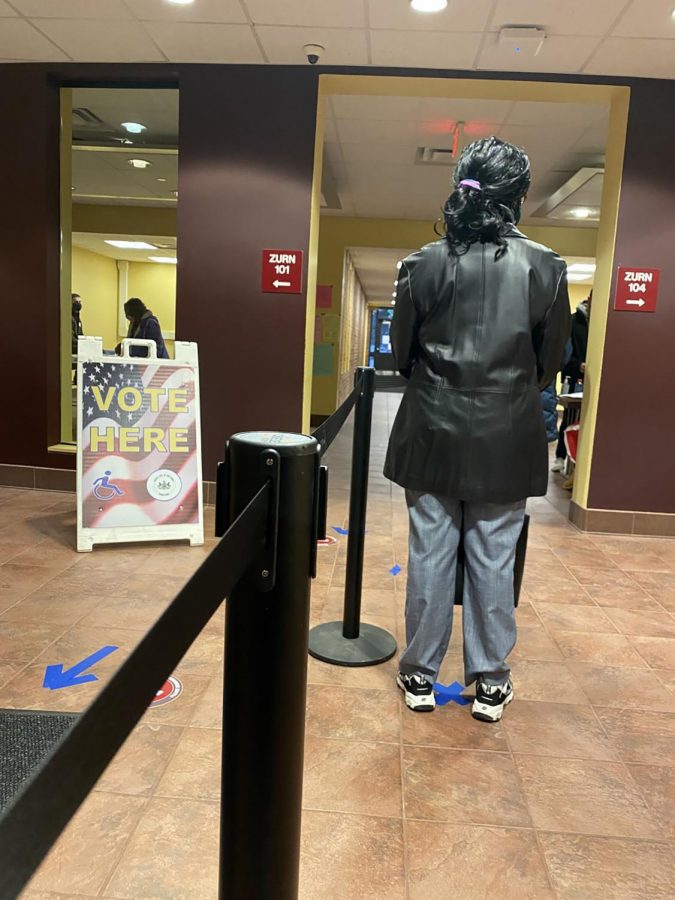Students share views on primary elections
April 6, 2021
With the end of the spring semester just weeks away, the focus will soon be turning to the upcoming primary election and how local races will impact not just Erie, but Gannon.
The primary election, which will be held May 18, will feature several key races for Erie – races for county executive and mayor.
Races for County Council and City Council will also be held.
Incumbent Erie County Executive Kathy Dahlkemper, who has held the office since 2014, announced in December that she would not seek reelection for a third, four-year term.
Previously Dahlkemper, a Democrat, had been elected in 2013 by defeating incumbent County Executive Barry Grossman in the Democratic primary; she then won the general election with 57% of the vote.
Dahlkemper’s reelection in 2017 was much more narrow, winning by only 307 votes against Republican Art Oligeri.
Previously, Dahlkemper had been elected in 2008 to represent the now former 3rd Congressional District, defeating incumbent Republican Rep. Phil English.
Dahlkemper only served one term, losing to now Rep. Mike Kelly in the Tea Party wave of 2010.
Currently, four Democrats are looking to win the May Democratic nomination and succeed Dahlkemper as county executive.
According to the Erie County Voter Registration Office, they are Erie County Councilman Carl Anderson, Erie School Board President Tyler Titus, director of the International Institute of Erie Dylanna Grasinger and Conneaut Township Auditor Rita Bishop.
Titus, who made history in 2017 as the first transgender individual elected to public office in Pennsylvania, is trying to replicate history by being elected as county executive.
On the Republican side, entrepreneur Brenton Davis and public safety worker Shawn Wroblewski will compete for the nomination on the May 18 ballot.
Jeff Bloodworth, Ph.D., co-director of Gannon’s School of Public Service and Global Affairs, said that the county executive race is the “big enchilada.”
“Kathy Dahlkemper, who is as close to a Tom Ridge figure as Erie County Democrats have had, is retiring after two terms,” Bloodworth said. “It is a wide open race.”
Bloodworth said that each candidate will attract certain demographics and portions of the county.
“I would think that Anderson will attract more Erie County (Millcreek) voters and Titus will get younger, more progressive voters,” Bloodworth said. “Ms. Jackson-Grasinger is the head of the International Institute. That gives her some name recognition with our sizable immigrant community, plus she has run an organization.”
The mayor’s race will feature a battle in the Democratic primary between incumbent Mayor Joe Schember and Erie School Board member Tom Spagel, as well as Sydney Zimmerman, a member of the local social justice group Erie County United.
Schember, who is running for a second, four-year term, was elected in 2017 by clearing a seven-way Democratic primary and then by defeating Republican opponent John Persinger in the general election.
Schember, previously an Erie City Councilman, had worked for PNC Bank as a vice president and attended Gannon University.
For the mayor’s race, no Republican filed to run.
Bloodworth said that despite Schember having two primary challengers, the race should be uneventful.
“He is broadly very popular and is campaigning very hard,” Bloodworth said. “ I don’t see him having too much trouble. “
Bloodworth said that the presence of younger, more diverse candidates running in other local races for City Council and the previously mentioned races is indicative of changing politics.
“When I moved here 15 years ago, a Democratic machine still kind of existed,” Bloodworth said. “Today, there are more opportunities for lesser-known, young candidates. It should be fun to watch.”
Bloodworth said that this election cycle reminds him of 2017 in one way: “churn.”
“For years and years, Erie’s elections featured a lot of the same cast of characters,” Bloodworth said. “For some reason, 2016 spurred a real change. Lots of new faces ran for city and county council and school board. Plus there was an actual real live race for mayor, which featured a competitive Republican in the race.”
Gannon students who have been following the political scene have developed support for candidates in both races.
Chloe Kernan, a junior public service and global affairs major, said that she supports Schember in the mayoral race.
“He’s been mayor before with good experience,” Kernan said. “His banking background makes him great for budgeting and allocating money for Erie.”
Josh Staley, a junior political science major, said that in the county executive’s race, he supports Titus.
“Not only are they a historic candidate, but they are ready to fight for progressive policies and change in Erie County,” Staley said. “Their background and prior work shows that they’re ready to fight on day one.”
Matt Whaley, a sophomore history major, said that in the mayoral race, he was voting for Spagel.
“I appreciate his honesty and realist outlook on Erie,” Whaley said.
Whaley said he liked Spagel’s proposals on cutting the city’s budget deficit and his opposition to Schember’s decision to close city hall for 13 months.
“I don’t love his chances,” Whaley said. “But he is one of the first candidates I’ve seen in Erie who has the will to tell it how it is and not just serve platitudes.”
Whaley said that in the county executive race, he favors Davis, despite being unable to vote for him due to Pennsylvania’s closed primary system.
“I don’t outwardly support anyone running for the Democratic ticket,” Whaley said.
“County Executive as a position needs to be able to closely work with Erie’s mayor as Erie holds the most power. I believe that Brenton Davis would be able to work best with Tom Spagel.”
“As candidates, they both see the issues that truly plague the city and they’re willing to propose hard-to-swallow solutions that are more effective than the virtue signaling we see out of most of our current politicians.”
Gannon students interested in voting in the primary will have until May 3 to register to vote if they are not already registered.
Students interested in voting by mail or by absentee ballot will have until May 11 to request one.
Pennsylvania is a closed primary state, meaning that only voters registered with a political party will be able to vote.
MICHAEL GUIDO






